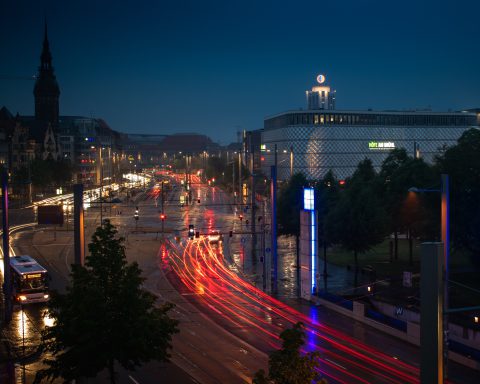It’s now been half a year since the Leipzig branch of Karstadt Department Store shut down, in February 2019.
In May 2018, after the owner of its building had announced the rent would be raised by 68%, Leipzigers formed a “human love chain” around the store, and Karstadt collected 50,000 signatures of support. To no avail – negotiations led nowhere, and being unable to accept the new rent, Karstadt had to leave.
Since then, so many other (crazy) things have happened in the world that many of us may no longer think of Karstadt – except when we happen to pass by its former building, which is still empty and awaits an undisclosed future.

In the following, I would nonetheless like to share some more thoughts on the “Karstadt affair,” because I believe we can draw some interesting lessons from it.
They pertain to the causes for Karstadt’s demise. LeipGlo writer Maeshelle West-Davies, who invited readers to the “human love chain” back in 2018, explained the store was threatened with being closed by “gentrification.” In fact, the rent increase was excessive, and the landlord responsible for this was a shady real-estate group based in – of course – Luxembourg. When representatives of Karstadt went there to hand over a box with the 50,000 signatures from supporters, the guy at the company’s door was heartless enough to dump it right into a trash can with the visitors watching.
Alas, the story is more complex than “good old Karstadt vs. evil profiteer.” Don’t you actually find it strange that a major corporation such as Karstadt, with department stores all over Germany, did not own the building of its Leipzig branch?
Have you ever heard of a branch of, say, Aldi or IKEA being forced to shut down by a greedy landlord? You haven’t, because those corporations own the spaces they use for their business, and so did Karstadt in Leipzig – until 2002. That year, Karstadt managers had the glorious idea of selling the building on Petersstraße, a department store since 1914, to a real-estate fund, and continue there as a tenant. That fund then sold it to the Luxembourg firm in 2017.
Therefore, the participants of the “love chain” and signers of the petition should have gone not to Luxembourg, but rather to the managers responsible for the sale back in 2002.
They should have asked these geniuses to give back the millions of euros they received in salary as compensation for their glaring naivety.
Even if you sell your property to “nice” investors, at some point the latter may sell it on to somebody who doesn’t care who rents the property, but only for how much. If you don’t like this, don’t sell your property.
On the other hand, the Karstadt Corporation has been in a crisis since the early 2000s. Owners changed every few years. Branches were shut down for economic reasons. The corporation went bankrupt in 2009, to then be rebooted in 2010. It merged with Kaufhof, the other German chain of department stores, in 2018.
The crisis played a role in the 2002 decision to sell the building in Leipzig, and those of four other branches. In 2006, Karstadt sold all its remaining properties and then rented them back as well, to pay off its debts. As the crisis went on all the same, Karstadt has also been unable to buy the properties back.
On the surface, the crisis of Karstadt sprang from continuous mismanagement. Yet deep down, it was a structural crisis – caused by a fundamental shift of the retail industry towards the Internet.
Maeshelle says that the Leipzig Karstadt would have to close even though it survived “two world wars, socialism and online shopping.” But in fact, it closed because it did not survive the latter.

The first online retailers emerged in the mid-1990s. In Germany, they accounted for 0.3% of all retail sales in 2000, but for 10.2% of them in 2018. The founder of Amazon, Jeff Bezos, today is the wealthiest person alive because he foresaw the trend, or recognized the opportunities, of online retail when he created his company in 1994. The managers of Karstadt and other retailers in Germany (and around the world) did not. They set up online channels too late and in poor quality.
In Leipzig, you can observe what such failures might lead to – but don’t blame it on the wrong people. Nor is there a grudge to hold against Amazon and the like. They are so successful because they provide customers with better services.
On a website, you can find a greater variety of products than would fit in ten Karstadt branches, and you get more information and reviews on them than any one human salesperson would be able to know. Nonetheless, products may even be cheaper online, and they come straight to your house, without your having to go out.
As this is obviously what customers want, in 2014 two out of three people in Germany said they rarely shopped in department stores. I suspect the same applies to many of the people protesting against the rent increase for the Leipzig Karstadt last year.
Ironically, when department stores first emerged from the mid-19th century onwards, they were seen not as victims but, like Amazon today, as a threat – to the small shops dealing in clothes, shoes, housewares, groceries, cosmetics, or other products.
Department stores combined all those things under one roof, so customers would no longer need to go anywhere else. In 1883, French writer Émile Zola depicted the “battle” of small retailers against this in his novel The Ladies’ Delight (Au Bonheur des Dames). Would these owners now have to give up their shops to become mere employees of a department store?
In the end, their fears, shared by many politicians and social scientists, proved to be unfounded. Small shops continued to flourish next to department stores, because the latter’s predominance was cultural rather than economic.
With e-commerce, it’s certainly different.
However, e-commerce is a result of technological progress providing customers with certain advantages. With creativity and courage, even managers of traditionally “offline” retailers can and must expand their online activities to offer those advantages as well. Otherwise, Karstadt should shut down all its remaining branches, since there’s no need for them anymore.
A store or business model that no longer benefits customers has lost its purpose and can’t be conserved just for the sake of nostalgia.










